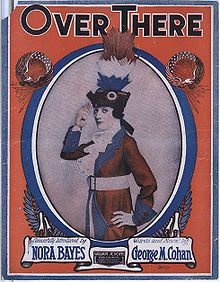

| "Over There" | |
|---|---|

1917 sheet music cover with Nora Bayes
| |
| SongbyNora Bayes | |
| Published | 1917 |
| Genre | War-time song , March , Tin Pan Alley |
| Songwriter(s) | George M. Cohan |
"Over There" is a 1917 song written by George M. Cohan that was popular with the United States military and public during both world wars. It is a patriotic song designed to galvanize American young men to enlist and fight the "Hun". The song is best remembered for a line in its chorus: "The Yanks are coming."[1]
Cohan wrote it after he had learned that the US had abandoned their policy of non-interventionism and planned to enter World War I on the side of the Allied Powers.[2] It has been revived on various occasions during and after World War II.[1] It was not heavily used during the Vietnam War but has been used since the September 11 terrorist attacks.[3]


As sung by early 20th-century recording artist Billy Murray:
Verse 1
Johnny,[a] get your gun, get your gun, get your gun.
Take it on the run, on the run, on the run.
Hear them calling you and me,
Every Son of Liberty.
Hurry right away, no delay, go today.
Make your daddy glad to have had such a lad.
Tell your sweetheart not to pine,
To be proud her boy's in line.
Verse 2
Johnny, get your gun, get your gun, get your gun.
Johnny, show the Hun you're a son of a gun.
Hoist the flag and let her fly;
Yankee Doodle,[b] do or die.
Pack your little kit, show your grit, do your bit.
Yankee[c] to the ranks from the towns and the tanks.[d]
Make your mother proud of you
And the old red, white, and blue.[e]
Chorus
Over there, over there,
Send the word, send the word over there
That the Yanks are coming, the Yanks are coming,
The drums rum-tumming everywhere.
So prepare, say a prayer,
Send the word, send the word to beware –
We'll be over, we're coming over,
And we won't come back till it's over, over there.
| National |
|
|---|---|
| Other |
|